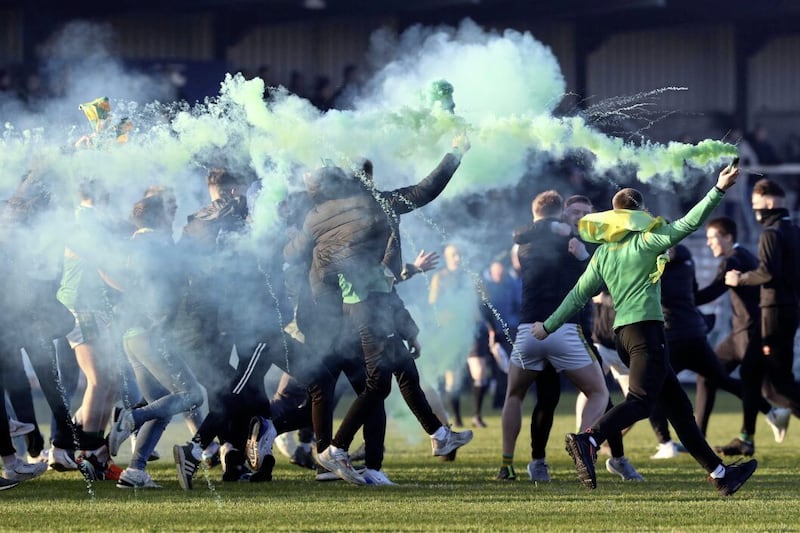SOME people have a football brain and Gavin ‘Horse’ Devlin is one of them.
As a footballer, Devlin defined the role of the modern sweeper.
In the 2003 All-Ireland semi-final between Tyrone and Kerry, his positioning and marshalling played a key role in snubbing out the threat of Colm Cooper.
In their All-Ireland quarter-final against Roscommon, the Kerry men racked up 1-21. Cooper ran riot as his team-mates repeatedly found him with diagonal balls.
It was all too easy for ‘the Gooch.’
But when Kerry came up against Tyrone, they found their favourite avenue to ‘the Gooch’ was closed off to them.
Devlin, operating on the edge of the ‘D’, gave a masterclass in positional defensive play.
While many Tyrone fans will know that Devlin was a superb sweeper, they will perhaps not realise that he created and developed the role for himself.
Playing at corner-back in the Tyrone minor and U21 teams, Devlin repeatedly found himself pitted against corner-forwards who were deployed as third midfielders.
(For much of the latter half of the 20th century, this was the only known tactic in Gaelic football).
Rather than run around the pitch against a largely ineffective corner-forward, Devlin thought it would be wiser to stand his ground and remain in defence.
So, that’s what he did. Not only that, he took it upon himself to direct and manage his fellow defenders.
The important thing to note is that Devlin did all of this at his own behest. It was his idea. When Mickey Harte saw how effective it was, he stuck with it.
Every time Tyrone came up against a team that played with a third midfielder, Devlin was given the license to perform his chosen role.
By the time Tyrone came up against Cooper & Co in 2003, the Ardboe man was the Franco Baresi of Gaelic football. Gavin Devlin knows football.
That’s why Mickey Harte has him in his current management team.
It’s also why Slaughtneil, the reigning Derry champions, brought him up the Gortinure Road.
Under Devlin’s guidance, the talented Shane McGuigan has evolved from an excellent left-footed forward into a lethal marksman who can score from either foot.
McGuigan was the man-of-the-match when Slaughtneil turned the tables on my own club Glen in this year’s county quarter-final.
At the weekend, Glen confirmed that Malachy O’Rourke will be our new manager next year.
There is no need to extol Malachy O’Rourke’s virtues as a manager.
He is one of the best in the business, as is his coach, Ryan Porter.
It goes without saying that O’Rourke’s move to Glen has already added an extra dimension to the Derry championship. But looking at the bigger picture, the big winner is Derry football.
The players of Glen and Slaughtneil will now both be exposed to two of the finest football minds in the country, and that’s not to undervalue the incredible job that Adrian Cush has done at Magherafelt.
These premium quality club management teams can only improve the fortunes of the Derry county team.
Given Derry’s lack of Championship success over the past 22 years, we need all the help we can get.
*******
Local hero Tommy a worldwide inspiration
BEFORE writing this column, I go for a run.
For this week’s canter, I made a new playlist on Spotify and called it: Tommy 10/10.
The playlist is in honour of Tommy Hughes, our local running hero who at the weekend cut six minutes off the over-60s marathon world record.
After 14-and-a-half laps of the Down Royal Racecourse the former Olympian crossed the finish line in a time of 2:30:02.
A marathon time of 2 hours 30 minutes requires holding a steady speed of around 5 minutes 45 seconds per mile.
For the six-mile run in which I listened to Tommy 10/10, my average speed was 8 minutes 30 seconds per mile.
For plodders like myself, running one sub six-minute-mile would be a major achievement. Doing it 26 times in-arow defies comprehension.
Yet, while I can’t conceive how a 60-year-old veteran can run at such an extraordinary pace, that is not the real reason why I am so utterly in awe of Tommy Hughes.
It’s Tommy’s unrelenting consistency that mesmerises me. I run on the same back roads that he does, a warren of lumpy, rolling hills that weave around the hinterlands of Maghera and Gulladuff.
There is nothing dramatic or even panoramic about this landscape. It’s just a runner’s dojo. A never ending series of calf killing, leg building hills.
Tommy’s routine is 10 miles in the morning and 10 miles in the evening.
How he does it, I don’t know, but I think about it most days!
Last Sunday, before Tao Geoghegan Hart set off on the time trial that would win him the Giro d’Italia, the unheralded Londoner received invaluable advice from Bradley Wiggins – a man he grew up idolising.
We all need our heroes. We all need our role models. Too often those heroes let us down.
I couldn’t be in awe of a man like Bradley Wiggins.
There are too many TUEs, and Jiffy bags and question marks.
However, I have no problem being in awe of Tommy Hughes.
We run on the same roads, only Tommy runs a lot faster. A helluva lot faster.
But Tommy is not just running at breakneck speed and breaking records, he is inspiring everyone around him. And his orbit is huge.
From Gulladuff, it now spans across the globe.








